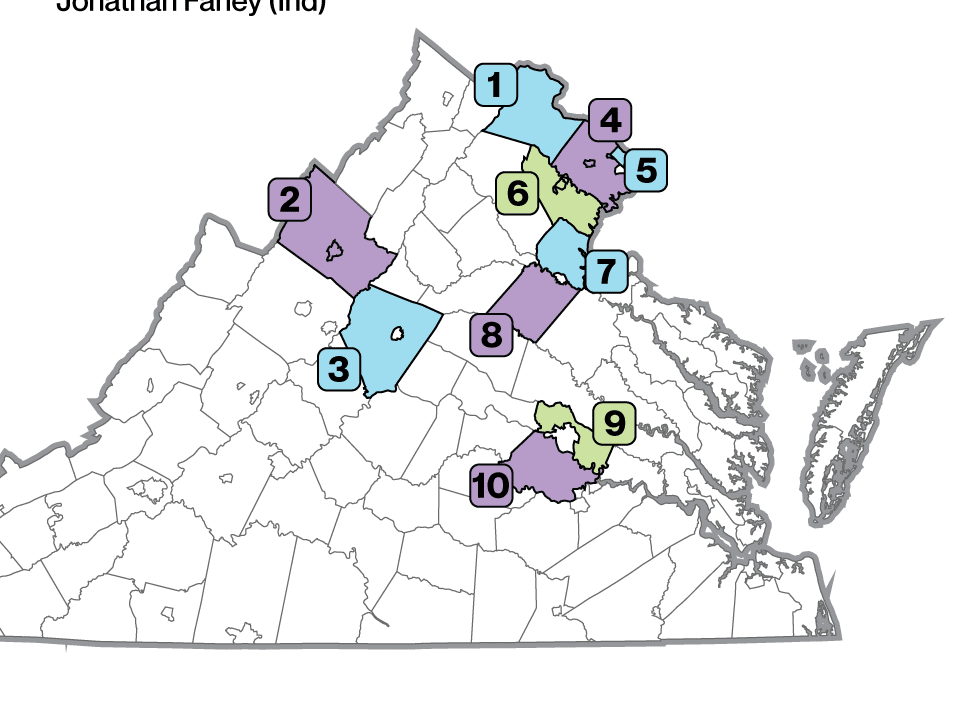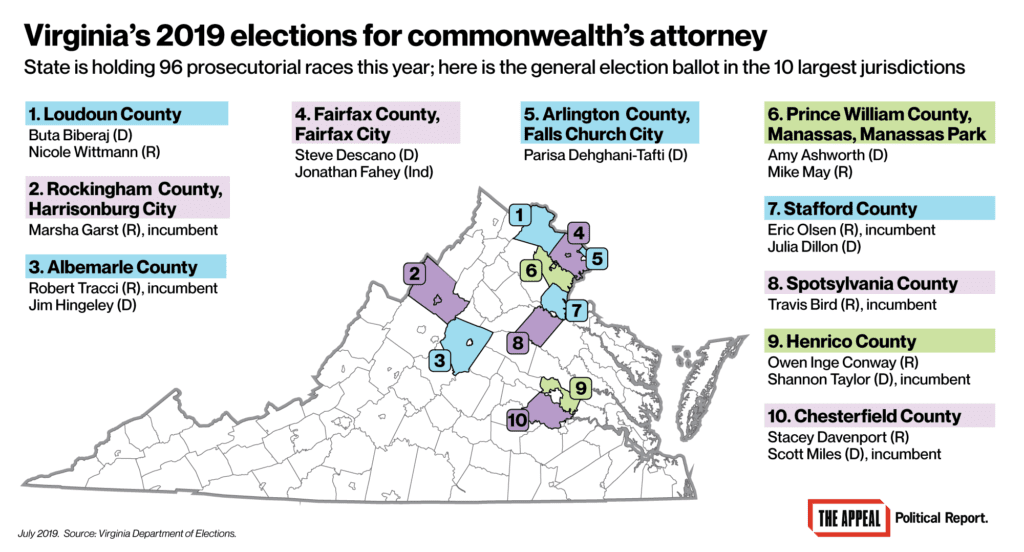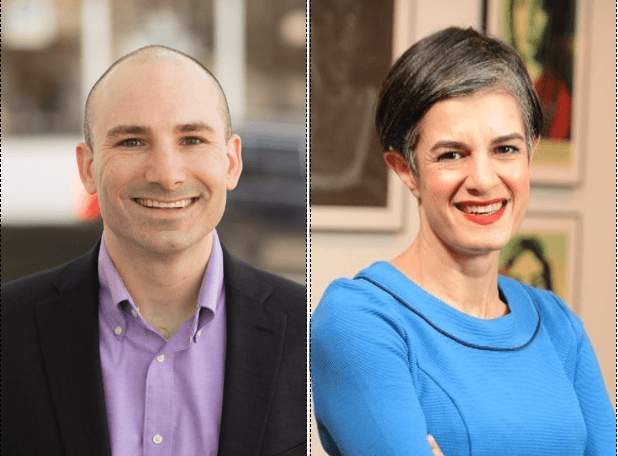Will November Bring a “Wave” of Reform Prosecutors in Virginia?
Competitive elections for prosecutor will shape the prospects of decarceral reforms, from Fairfax to Chesterfield.
Daniel Nichanian | July 18, 2019


This article originally appeared on The Appeal, which hosted The Political Report project.
Competitive elections for commonwealth’s attorney will shape the prospects of decarceral reforms, from Fairfax to Chesterfield
Virginia’s Democratic primaries shook up the state in June, when candidates running on platforms of ending mass incarceration ousted the commonwealth’s attorneys of two of the state’s biggest counties. Will voters double down in November’s general elections?
“I’m hoping that I’ll be elected with a wave of other reform prosecutors,” Parisa Dehghani-Tafti, one of those candidates, told the Political Report in February.
Dehghani-Tafti, who defeated incumbent Theo Stamos in Arlington County, is now unopposed. But other candidates with decarceral platforms face competition. Seven of Virginia’s 10 biggest jurisdictions will host a contested election for prosecutor; most of them feature candidates who say, with varying degrees of ambition, that criminal justice reform is important to their campaign.
These races will shape the politics of prosecution across the state, from Fairfax and Prince William in Northern Virginia to Albemarle and Chesterfield further south. Prosecutors “are in position to prioritize community partnerships and restorative justice, education, and treatment over jail sentences, and end the criminalization of poverty and the cycles of job loss, housing loss,” said Maya Castillo, the political director of New Virginia Majority Education Fund, a group involved in criminal justice reform.
It would represent “a disruption for the systems of mass incarceration” if candidates committed to such reforms and to decarcerative goals were to win, Castillo told the Political Report.
But in dozens of smaller, rural Virginia counties that are often located in the state’s southern part —the sort of area where decarcerative reforms has lagged behind—the prospect of overhauling the legal system through the ballot box remains far-fetched because competition is absent. In 50 of Virginia’s 70 counties with fewer than 50,000 residents, the only candidate on November’s ballot is the incumbent prosecutor.
“There is no easy solution,” Jenny Glass, the political director of the ACLU of Virginia, told the Political Report. “but we definitely need to build more local power in the southwest so residents feel equipped to question these incumbents on what they are doing to reduce incarceration and racial disparities. We have been trying to make a point of heading out to places like Martinsville and Abingdon to hold member forums where we can educate folks on the issues and how they can push these candidates.”
Virginia is electing 96 commonwealth’s attorneys this year—one for each of its counties as well as some but not all of its independent cities. The Political Report has published a master list of the candidates running in each jurisdiction, and will cover races individually throughout the fall.


What do we already know about some of these elections’ stakes—from pot and discovery to voting rights—and about the individual elections likeliest to have an impact?
Marijuana and discovery rules loom large: Virginia’s incarceration rate, which is higher than the national average, rests in part on the shoulders of commonwealth’s attorneys. They exercise great discretion on how harshly to prosecute and what sentences to seek. “For me, it does all come back to the prosecutor,” Steve Descano, who is running in Fairfax County, told the Political Report in April. “If you were to have a prosecutor who was committed to making a dent in mass incarceration and ending mass incarceration, it would be within their powers.” One of his proposals is to charge more cases at the misdemeanor level, rather than at the felony level, which carries far more severe penalties.
“We want to see candidates making a commitment to reduce the incarcerated population in Virginia in a way that drives down the racial disparities in our criminal justice system and we want to see detailed plans and data to support those commitments,” Glass said. “These positions are also consistent with the changes that voters want to see,” she added, pointing to a poll commissioned by the ACLU that found likely voters think the system ought to change.
Two issues loom large in Virginia. One is discovery rules. Prosecutors here face lax requirements as to what information they must share with a defendant’s legal team, a situation critics call “trial by ambush.” The state Supreme Court mandated reform effective this July, but the changes were delayed and information-sharing still hinges on good will. “I’d like to see consistency and a commitment to early and thorough discovery in all cases,” Shawn Stout, a defense attorney in Prince William County, told the Political Report.
Second is marijuana. Some commonwealth’s attorneys have announced they will stop marijuana prosecutions, and the Attorney General has called for legalization. But resistance remains strong too. Influential prosecutors helped kill legislative reform, and local judges have blocked cases from being dropped. How candidates handle marijuana, as well as potential conflicts with other local officials, is a defining issue in this election.
Two reform candidates ousted incumbents, but November awaits for one. For Dehghani-Tafti and Descano, who laid out their proposals to overhaul prosecution during the primaries, defeating sitting prosecutors in June was the hardest part. But Descano in Fairfax, unlike Dehghani-Tafti in Arlington still faces a general election opponent, independent Jonathan Fahey. Fairfax is a largely Democratic jurisdiction, which gives Descano an edge. Fahey’s campaign has no online trace as of today, and he did not answer a request for comment about his views.
In populous counties, competitive elections feature contrasts on reform: Jim Hingeley, the former chief public defender of Albemarle County, put mass incarceration front and center when he launched his candidacy. “People ask, why does our country put more people in prison than any other place on earth even though we know mass incarceration is harmful and does not make us safer?” he said. Hingeley is a Democrat, running against Republican Commonwealth’s Attorney Robert Tracci in a county carried by Hillary Clinton in 2016 .
He is one of a series of candidates talking about criminal justice reform in Virginia jurisdictions larger than 100,000 residents. Descano told the Political Report in April that, if elected, he would he would work to put together a “coalition” of like-minded prosecutors and lobby for progressive legislation in the state capitol. This promise hinges in part on what happens in elections like these.
Scott Miles was elected prosecutor of swing Chesterfield County in a special election last year, and he has since announced changes such as not seeking jail time for marijuana possession, not treating drug possession as a felony, and curbing the use of cash bail. A Democrat, Miles is now running for a full term against Republican Stacey Davenport, who says she wishes to roll back some of the changes and who faults Miles for effectively decriminalizing certain offenses.
In Prince William County, Paul Ebert is retiring with a punitive record after 51 years in office; in neighboring Loudoun County, Jim Plowman, who authored state prosecutors’ brief against rights restoration in 2016, is not seeking reelection. While candidates running to replace them have not emulated the boldest stances of some running elsewhere in the state, contrasts have emerged on issues like cash bail, jail expansion, or the proper scope of diversion. The Political Report reported last week on Prince William County. “It is not smart to focus on prosecuting victimless crimes like drug possession or driving on suspended,” said Democratic nominee Amy Ashworth. The Political Report will return to the Albemarle, Chesterfield, and Loudoun races in months ahead.
Henrico and Stafford are the other two counties above 100,000 residents with contested elections this year. But the websites of challengers Owen Conway and Julia Dillon indicate no position on matters pertaining to criminal justice reform or decarceration as of this week; neither candidate replied to a request for comments regarding their views.
Twenty prosecutors who fought expanding voting rights are seeking re-election this fall: In 2016, 43 prosecutors filed a joint legal brief supporting a lawsuit against Governor Terry McAuliffe’s bid to end the lifetime disenfranchisement of Virginians with felony convictions. This erupted as an issue in June’s Democratic primaries. McAuliffe endorsed the challengers to two Democrats, Stamos and Ray Morrogh, who had signed on to that amicus brief. Both lost. Another Democrat who joined the lawsuit (Prince William County’s Paul Ebert) is retiring.
But November will bring no such sweep: Of the 20 prosecutors who signed the brief and are on the November ballot, 17 are unopposed. All are Republicans or independents. This leaves three incumbents who face a challenger: Republican Robert Tracci in Albemarle, Republican Paul Walther in Culpeper, and independent Diana O’Connell in Orange. Prosecutors may again try to influence statewide debates on this issue when the legislature next reconvenes.
With Democrats vying to seize control of the state government for the first time since 1993, the politics of voting rights, but also marijuana and other criminal justice reform issues, could soon change in Richmond too.


